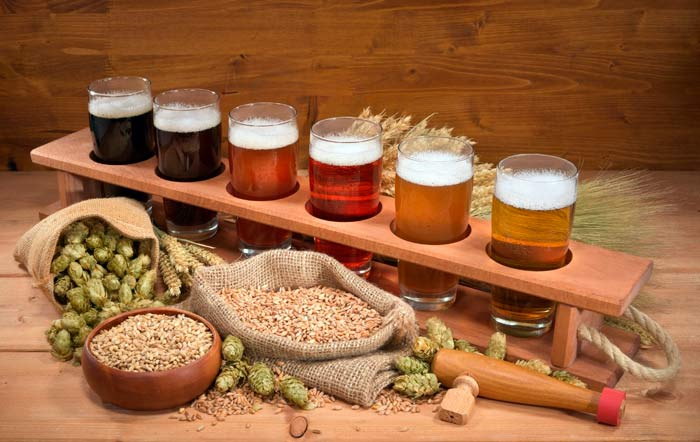STEINER: What is the most popular traditional German drink? Beer, of course!
According to recent research, each German drinks an average of about 112 litres of beer a year, and German breweries brew about 8.9 billion litres of beer annually. Germany is also one of the few countries where beer is officially legal from the age of 16.
The popularity of this yeast drink is due to the incredible variety of varieties, flavours, aging and affordable price range. The culture of drinking German beer has been developing over the last millennium. Germany is home to the oldest existing brewery in the world, Weinstephan, founded in 1040 in Freising.
According to legend, in 725, St Corbinthian and twelve companions came to Weinstephan and founded a Benedictine monastery on Mount Nerberg, where they also brewed beer. Over time, the art of brewing became of industrial importance for the town and the Weinstephan Monastery Brewery was established here. In the early 19th century, the monastery became state-owned, and the Weinstephan brewery's quality mark was confirmed by the unique right to use the Bavarian state coat of arms as a brand mark.
Today, the Weinstephan Research Centre for Food, Land Use and Environment is a branch of the Technical University of Munich. It is also home to the most famous faculty of Brewing and Beverage Technology, where the best brewers learn their craft. Students from all over the world are eager to receive a high-quality education in brewing from renowned beer masters. When enrolling students, the average score of the applicant is not taken into account, but only one third of students manage to get the coveted bachelor's degree. We were able to learn more about the details of studying at the Faculty of Brewing from Ilya Kolodchenko, a sixth-semester student.
STEINER: How many universities in Germany offer the opportunity to study the art of brewing and is it really not possible for every student to master the art?
Ilya: In Germany, there are currently only three institutions in this speciality: Technical University of Munich, Technical University of Berlin and Hochschule Weinstephan-Trisdorf. In my opinion, brewing is best studied at its roots, or rather, within the historical heritage of the beer industry. I chose the TU Munich campus in Freising. At first glance, it may seem that this is a narrow profession, but a brewer is undoubtedly an expert in the production of both alcoholic and non-alcoholic beverages. We study in detail such sciences as biochemistry, mechanical engineering, systems engineering, thermodynamics, hygienic design and many other fields that are not related to brewing. The learning process requires full immersion. In my case, it is quite important to always be on an equal footing with German students and show my competitiveness.
STEINER: What percentage of international students study at your faculty?
Ilya: Initially, the total number of students was about 150, of which five per cent were foreigners. Now, three years later, the number of students has dropped to 40, and there are only four foreigners. Based on this trend, it can be argued that international students have scientific potential and a great desire to learn all the intricacies of brewing.
STEINER: According to the Bavarian Beer Purity Act, passed in 1516, only water, barley malt, yeast and hops must be used to produce this drink. Is this recipe still relevant today?
Ilya: Of course, thousands of German breweries still follow the four-ingredient rule, not only in Bavaria but also in other German federal states. It is worth noting that these are only the basic ingredients, without which beer would not acquire its original taste and aroma. In addition, there are many other food additives that are used to improve the chemical composition of water, efficient extraction of nutrients from malt, balanced hop bitterness and favourable conditions for alcoholic fermentation. It is worth mentioning that there are also exceptions to the rule, namely, mini-breweries, called craft breweries, which are those who have departed from the original traditions and dared to experiment.
STEINER: Is it possible to brew beer at home and what is needed for this?
Ilya: I can confidently say that every student at my faculty has asked this question at some point. I started thinking about home brewing after my first year at university, when I wanted to put my theoretical knowledge into practice. As a result, I have two brews a month with a relatively low monetary investment in equipment and supplies. At home, you can improve your skills by using all kinds of resources, which will allow you to develop your own recipes in the future. There are many different options for starting your own "production" of a frothy drink. For those who like to play it safe and do not yet know whether they should take up the craft of brewing, so-called hopped malt extracts have been invented. They are a sticky, highly concentrated substance. The extract must be diluted with hot water and then yeast added. In home brewing, sterility and general hygiene rules undoubtedly have an impact on the final product. If you use the above-mentioned extract, the risk of malignant bacteria infecting the unripe beer is minimal. I, in turn, started with a more complicated brewing method, namely, writing my own recipes, calculating the general parameters of beer and using ordinary kitchen items.
STEINER: Did you do your internship at a brewery?
Ilya: A three-month work placement is one of the most important prerequisites for university. Without any experience or knowledge, I was a trainee at the Gräfliches Hofbrauhaus brewery in Freising. I was tasked with getting to know the main stages of production in the wort brewing, fermentation, filtration and bottling halls. Under the supervision of my mentors, I was tasked with collecting yeast from the fermentation tank, feeding hops into the brewing boiler and measuring carbon dioxide during the maturation stage of beer.
STEINER: What advice would you give to those applying for your degree and what career prospects do you see for yourself?
Ilya: If you want to study brewing, you should focus on the exact sciences at school and consult books such as "Technologie Brauer & Mälzer" (Wolfgang Kunze) and "Abriss der Bierbrauerei" (Ludwig Narziß). I also advise international students to do their internships in a timely manner, for example, during the holidays at Studienkolleg, in order to gain as much experience and knowledge as possible. It is worth noting that living and studying in Bavaria requires adaptation to the local accent. Education is conducted in German, but to be able to work internationally, you need to maintain a good level of English. After my bachelor's degree, I plan to continue my studies and apply for a master's degree. With such a wealth of knowledge, the range of opportunities is very diverse in any area of the food industry, such as winemaking, dairy, spirits and even the design and assembly of breweries of any capacity.



